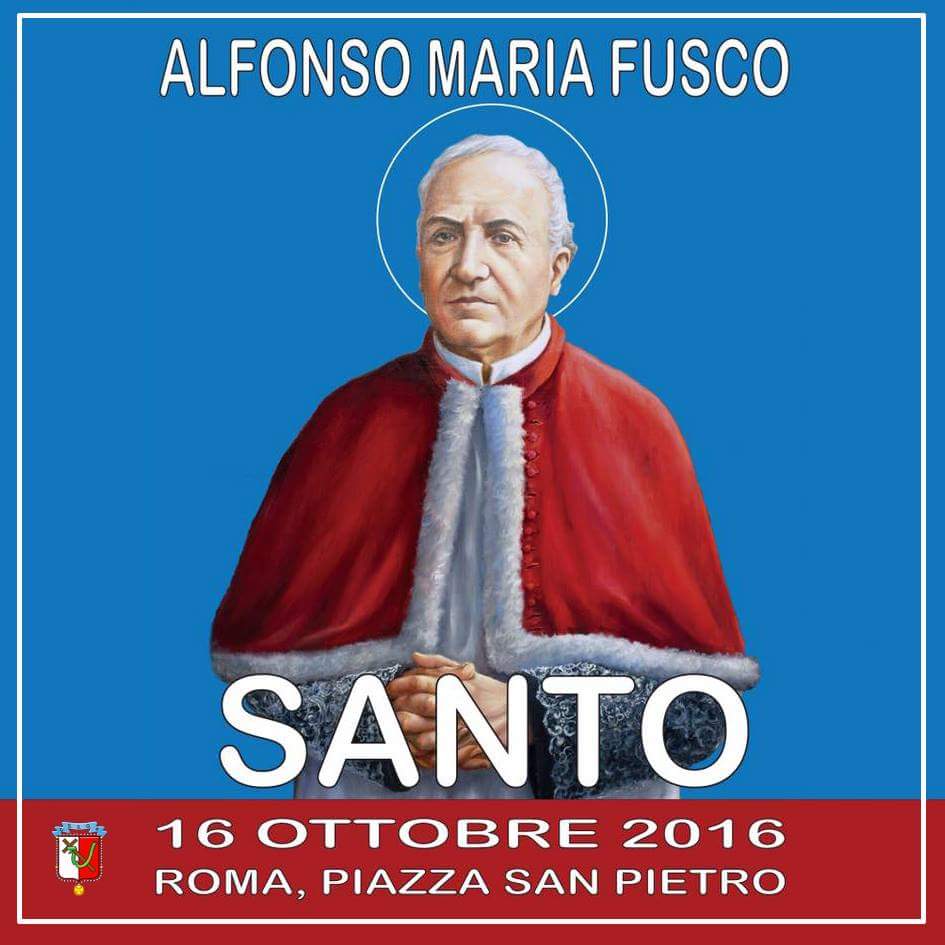 Alfonso Maria Fusco was born on March 23, 1839 in Angri, in the Province of Salerno, in the Diocese of Nocera-Salerno, in Italy. His parents Aniello Fusco and Giuseppina Schiavone were childless and prayed at the tomb of St. Alphonso De Liguori. One Redemptorist priest told them that they would have a son, whom they should name ‘Alfonso’ and he would become a priest imitating the life of St. Alphonso De Liguori. The promised child was brought up in Christian principles. Alfonso told his parents when he was eleven years old that he wanted to become a priest and on November 5, 1850, he entered the Episcopal Seminary of Nocera dei Pagani.
Alfonso Maria Fusco was born on March 23, 1839 in Angri, in the Province of Salerno, in the Diocese of Nocera-Salerno, in Italy. His parents Aniello Fusco and Giuseppina Schiavone were childless and prayed at the tomb of St. Alphonso De Liguori. One Redemptorist priest told them that they would have a son, whom they should name ‘Alfonso’ and he would become a priest imitating the life of St. Alphonso De Liguori. The promised child was brought up in Christian principles. Alfonso told his parents when he was eleven years old that he wanted to become a priest and on November 5, 1850, he entered the Episcopal Seminary of Nocera dei Pagani.
When he was still a seminarian, he had a dream where Jesus of Nazareth told him “Alfonso, You should found an Institute of Sisters that you will call ‘Of the Nazarene’ and an orphanage for boys and girls. The ground is ready; you need to only build it. As soon as you become a priest, you should do this.” On May 29, 1863 he was ordained by the Archbishop of Salerno, Monsignor Anthony Salomone, amid the joy of his family and the enthusiasm of the people. He meditated and prayed much as he waited to realize this dream. Faith is the power that gives birth to miracles; God gives to him who possesses it. Alfonso experienced these miracles in daily life. He began his work from nothing.
And so, as a newly ordained priest Alfonso began a little school for them in his own house, taught the basics of their religion and instilled in their hearts love of God and of neighbor. Alfonso recognized that a quality education was the best gift one could give a youngster to make them good citizens of earth and heaven. He needed help in accomplishing this.
In Alfonso’s days there were no Sisters in Angri. As a result of the anticlerical atmosphere rampant throughout Italy in the 1800’s, religious communities had been forced to disperse. Alfonso saw the absence of Sisters as an opportunity to bring them back to Angri. From a dream he had while in the seminary, he felt his call was to establish a religious group of Sisters to help him with his work with the children. He learned that a pious, wealthy widow of the parish, Mrs Graziani, was also concerned about the plight of young girls and wished to start an institution to help them. Alfonso realized the intervention of God and took this as an opportunity for collaboration. He was convinced in the core of his being that the care of young girls and boys through the founding of a religious group of Sisters was God’s Will for him.
One day while at Mrs Graziani’s house he met a pious young woman from the parish called Maddelena Caputo. In her Alfonso found a “soul-sister” who shared in his dream. In 1878 after overcoming many obstacles and being convinced that this was God’s plan for him, Father Fusco together with Maddalena Caputo and with the help of a few pious women of the parish committed themselves to caring for and educating the young children, especially orphans. Thus he began the Religious Community and Mission of the Sisters of St. John the Baptist.
Alfonso Maria Fusco was a true and devoted Son of the Church, a “Servant of God“. He was very kind, approachable and compassionately generous. Children were attracted towards him feeling welcomed in his presence. To these little ones he was truly the loving father that many did not have. Adults, too, did not hesitate to bring themselves to him presenting their needs, confiding their failings and sharing their hopes. As God’s servant, Alfonso was nonjudgmental. He did not condone what was wrong, nor did he judge people because of the circumstances that left them in need whether physically, emotionally, or spiritually. He accepted people as they were and gave untiringly of his time and energies to help them to help themselves.
Alfonso listened with Jesus’ heart the aching lives of people – he saw with Jesus’ eyes the hurt and troubled hearts; heard with Jesus’ ears the unspoken words and feelings; blessed with Jesus’ hands the needy and offered unconditional help. Alfonso made him graciously available to all and pointed them always toward the loving heart of God. Throughout his life, no matter how trying, how frustrating, how disappointing circumstances might be, Alfonso was true to his faith, to his ecclesial superiors and to the mission that he knew God had given him. In turn, God was even more faithful to him. Alfonso did not shrink from the task that God laid before him. Indeed, he remained faithful to it until he reached his destination in the Heavenly Father’s house on 6th February 1910.
